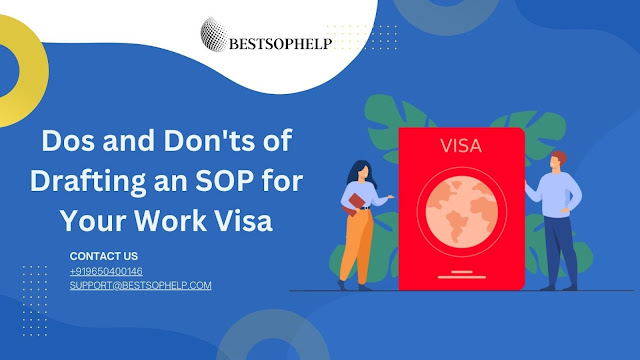Dos and Don'ts of Drafting an SOP for Your Work Visa
If you're an aspiring professional looking to embark on an international career journey, securing a work visa is likely one of your top priorities. Among the various requirements for obtaining a work visa, a Statement of Purpose (SOP) plays a crucial role in presenting your case to immigration authorities. An SOP is your opportunity to showcase your skills, intentions, and suitability for the job and the host country. To help you craft a compelling SOP that maximizes your chances of obtaining a sop for work visa, here are some essential dos and don'ts to keep in mind.
The Dos:
1. Research the Visa Requirements:
Before you start drafting your SOP, make sure you thoroughly understand the requirements of the work visa you're applying for. Different countries and visa categories may have specific criteria and documentation needs. Tailor your SOP to address these requirements directly.
2. Be Clear and Concise:
Your SOP should be well-structured and easy to understand. Clearly state your purpose and the reasons for seeking the work visa. Use simple language and avoid unnecessary jargon. A concise and well-organized SOP will be more effective in conveying your message.
3. Highlight Your Qualifications:
Emphasize your qualifications, skills, and experience relevant to the job position. Explain how your background aligns with the requirements of the role and how your expertise will contribute to the host country's economy or industry.
4. Express Genuine Intentions:
Clearly articulate your intentions for seeking a work visa and working in the host country. Discuss your career goals and how the job opportunity aligns with your long-term aspirations. Immigration officials appreciate sincerity and a clear sense of purpose.
5. Showcase Cultural Awareness:
Demonstrate your understanding of the host country's culture, values, and work environment. Highlight any research you've done about the local customs and how you plan to adapt and contribute positively to the new environment.
6. Provide Specific Examples:
Use specific examples to illustrate your achievements and experiences. Instead of making broad statements, describe situations where you demonstrated your skills or overcame challenges. These anecdotes make your SOP more engaging and believable.
7. Tailor Each SOP:
Avoid using a generic SOP for multiple applications. Tailor each SOP to the specific job and host country. Address the employer's needs and explain why you are an ideal fit for the role in that particular setting.
8. Show Enthusiasm:
Let your enthusiasm for the job and the opportunity to work in the host country shine through. Express your excitement about the role and your eagerness to contribute positively to the organization and the community.
9. Proofread and Edit:
Ensure your SOP is free from grammatical errors, typos, and inconsistencies. It's advisable to have someone else review your SOP as well. A well-edited and polished document reflects your professionalism and attention to detail.
The Don'ts:
1. Don't Lie or Exaggerate:
Avoid fabricating information or exaggerating your qualifications and achievements. Immigration authorities can easily verify details, and providing false information can lead to severe consequences, including visa rejection and potential bans.
2. Don't Copy Sample SOPs:
While looking at sample SOPs can provide inspiration, avoid copying them directly. Your SOP should reflect your unique experiences, skills, and aspirations. Plagiarism can lead to rejection and damage your credibility.
3. Don't Focus Solely on Personal Reasons:
While mentioning personal reasons for seeking a work visa is acceptable, the emphasis should be on your professional qualifications and contributions. Avoid oversharing personal details that are not directly relevant to your work.
4. Don't Be Overconfident:
Confidence is good, but arrogance is not. While highlighting your strengths, avoid coming across as overly confident or dismissive of others. Maintain a humble and respectful tone throughout your SOP.
5. Don't Discuss Irrelevant Details:
Stay focused on information that directly relates to your work visa application. Avoid discussing irrelevant personal experiences, unrelated achievements, or excessive background information.
6. Don't Use Complex Vocabulary Unnecessarily:
Using overly complex vocabulary or technical terms that are not necessary can make your SOP difficult to read and understand. Aim for clear and straightforward language to communicate your points effectively.
7. Don't Rush the Process:
Drafting a compelling SOP takes time. Start well in advance to give yourself enough time for research, writing, editing, and refinement. Rushed SOPs are more likely to contain errors and lack the necessary depth.
8. Don't Ignore Formatting Guidelines:
Follow any formatting guidelines provided by the visa application authorities. Adhering to font size, spacing, and other formatting requirements demonstrates your attention to detail and your ability to follow instructions.
9. Don't Make It Too Long:
While you want to provide sufficient information, avoid making your SOP excessively long. A concise document is more likely to hold the reader's attention and effectively convey your message.
In conclusion, your Statement of Purpose is your chance to make a strong case for why you deserve a work visa. By adhering to these dos and don'ts, you can create a compelling and authentic SOP that showcases your qualifications, intentions, and cultural awareness. Remember that the quality of your SOP can significantly impact the success of your work visa application, so invest the time and effort needed to make it exceptional.
For More Information Visit Now: SOP Help
Contact Us: +919650400146


.jpg)
Comments
Post a Comment